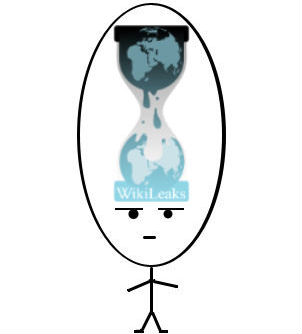At first I thought WikiLeaks was all about data. Data-journalism. Data-mining. Raw data hacked, transfered, mirrored, etc. Cold-blooded, hard facts. Then I realized it is not. As any culturally and politically defining moment, WikiLeaks exposes our hunger for *theory*. Abstract, verbose, fact-insensitive theory. Here are some examples, cherry-picked from the Web.

- Geert Lovink and Patrice Riemens Twelve theses on WikiLeaks
Lack of commonality with congenial, “another world is possible” movements drives WikiLeaks to seek public attention by way of increasingly spectacular and risky disclosures (…). Yet following the nature and quantity of WikiLeaks exposures from its inception up to the present day is eerily reminiscent of watching a firework display, and that includes a “grand finale” in the form of the doomsday-machine pitched, yet-to-be-unleashed “insurance” document (“.aes256”). This raises serious doubts about the long-term sustainability of WikiLeaks itself, and possibly also of the WikiLeaks model.
- Faculty of the College of Ontopoetic Machines Six Anti-Theses on WikiLeaks
Given the tiered nature of the internet—in that a hosting provider purchases bandwidth from a separate company, that probably purchases DNS service from a separate company—means that any activity can be forced offline by any intermediary if found to be in violation of the ToS. While you may have legal recourse via a civil suit, such an undertaking is oftentimes impossible due to the legal costs involved and the vastly unequal power differential. (…) Wikileaks draws on the tense affair between the antiauthoritarian ethos of hacker culture and the authoritarian logic of capital, also known as neoliberalism.
- Pavlos Hatzopoulos 3+1 notes on Wikileaks
The informatic digital spectacle produced by Wikileaks seems also to revolve around issues of connectedness and the possibilities to ephemerally ban it. The televised spectacle of leaking is supposed to reveal culpability: to point the finger at the officials who did wrong (who abused power, who broke the law) and to push for their removal from the web of government. Think of Watergate as the exemplary case in this regard. Wikileaks reveals, on the contrary, in a kind of self-referential way simply that government cannot control information, nor its informatic communication channels. In Cablegate, there is no culpability involved, no officials accused of abusing their power or breaking the law. The leaks reveal exactly this: that leaks cannot be contained, the pure fact that the state cannot control anymore the mutations of the digital informatic spectacle.
- Mark Bahnisch #Wikileaks: Five theses on the politics of #Cablegate
Human rights talk tends to crowd out politics: it becomes an appeal to the liberal principles of the dominant order, and a supplication that the liberal state and the mechanisms of justice act as they purport to promise. Hence, some of the depoliticising effects of slogans such as “Free Julian Assange”. Discussion increasingly turns to legal rights, conventions, natural justice, and both the nature of state action against dissident figures and the actual implications of #Cablegate for the state become obscured. (…) Of course, Julian Assange should have his rights; of course, legitimate questions can be raised about state action. But, as Pardot Kynes said to Liet-Kynes in Dune, “No more terrible disaster could befall your people than for them to fall into the hands of a Hero”. There are parallels with the audacious hope invested in Barack Obama, who’s delivered a kinder, gentler Imperial war-state. We save ourselves through collective action, not through a Saviour. A week messianism of the multitude is preferable to a Messiah.